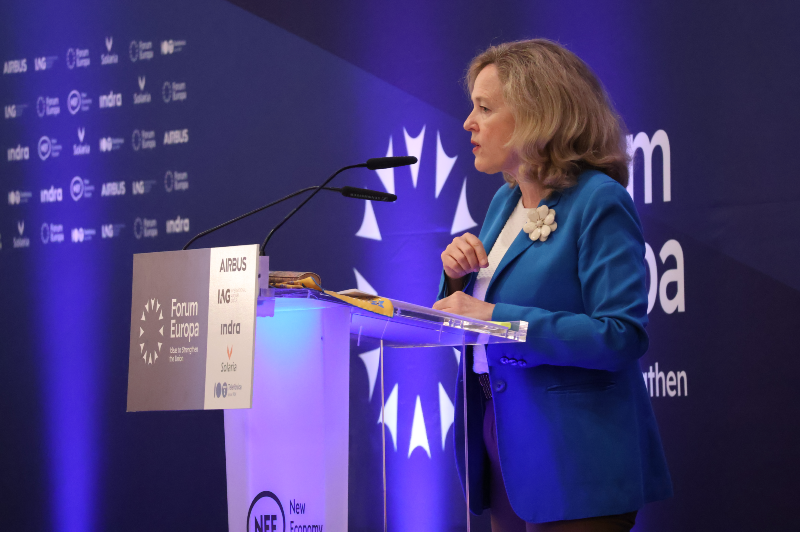The President of the European Investment Bank (EIB) and former Spanish Vice-President Nadia Calviño predicted on Monday at the Forum Europa in Brussels that activity and lending to the defence and security industry will increase in the second half of the year with the EIB's regulatory changes to facilitate lending to this sector.
Calviño took part in an event organised by New Economy Forum in the EU capital, where she referred to the approval earlier this month by the EIB's Board of Directors of the action plan to step up support for the European security and defence industry.
The plan involves updating the definition of "dual-use projects", removing the previous requirement that they have to derive more than 50 per cent of their expected revenues from civilian use, as well as the EIB approving support for new credit lines for innovative SMEs and start-ups in the security and defence industry.
The EU's investment arm expects these changes to accelerate investment in the sector with the deployment of 6 billion euro of funds available under the European Strategic Security Initiative (SESI) and the European Investment Fund (EIF) Defence Capital Facility.
Calviño stressed at the Forum that these changes "will undoubtedly" lead to a boost in security and defence activity and lending in the second half of the year and, to this end, she stressed that the EIB is working to establish "an alliance as quickly as possible". She explained that a new website has been set up on this issue, an expression of interest has been made and he called for participation. "We are determined to accelerate the 6 billion" euros to be deployed, she said, without wanting to offer forecasts for the sector because it is "premature" yet.
The EIB president, who took office at the beginning of the year, cited security and defence as one of the institution's priorities, along with accelerating digitisation and investment in technology in Europe, energy transition, support for agriculture and the entire value chain, boosting territorial cohesion and strengthening health and education infrastructure and housing, "which is a priority in many member countries".
She stressed that the bank has technical expertise, with a "very solid" portfolio, is a "catalyst" for private investment, offers the guarantee of the European budget in its loans and is "the voice of Europe", as it seeks "synergies with national programmes" to develop projects on the ground.
She stressed that by working on these priorities, the EU will offer its citizens expectations of a world with "peace", "prosperity" and "stability" and, in short, "maintaining Europe as the best place to live for future generations". Calviño said there were "many reasons" to be proud of Europe and cited three principles that guide the institutions: "unity, determination and solidarity".
For her part, the EIB's work focuses on complementing countries by financing projects to "avoid the lost decade" that she considered to have occurred after the financial crisis. She stressed that the "coordinated response" between all institutions and countries explains the "strong recovery and resilience" that the European economy and its labour market are showing today.
Calviño added that from her meetings with European leaders she detected a "strong alignment" between their priorities and the projects being developed on the ground with EIB money.
About Ukraine, she stressed that it is "a priority" for the Bank, which continues to "cooperate very closely with the Ukrainian government" and has mobilised 2 billion in investment since the start of the war in Ukraine.
She also indicated that outside Europe the EIB is active in mobilising 10% of its funds, and in Latin America, for example, investment is 20 times higher than in China.







